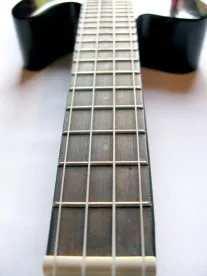Affirming a summary judgment in favor of defendant, the US Court of Appeals for the Eleventh Circuit determined that a copyright infringement lawsuit pertaining to the graphic design on a guitar made famous by a late heavy metal guitarist, was time-barred because the plaintiff’s copyright infringement claim was actually a claim of copyright ownership over the design. Buddy Webster v. Dean Guitars, et al., Case No. 19-10013 (11th Cir. Apr. 16, 2020) (Wilson, J.).
In 1985, guitar maker and technician Buddy Blaze (née Buddy Webster) modified a Dean ML electric guitar (which has a distinctive design consisting of a V-shaped headstock and V-shaped tailpiece) and hired a third party to paint a lightning storm graphic on the guitar. Two years later, Webster gifted the guitar to Abbott, who called the guitar “The Dean from Hell” (DFH) and made the guitar famous through his performances with the heavy metal band, Pantera, until Abbott was tragically murdered during a 2004 performance in Columbus, Ohio.
In the time following Abbott’s death, Webster learned that Dean was selling reissues of the DFH guitar. In 2006 and 2007, Webster, via email, informally objected to Dean’s sales of the reissued guitars without his permission. Notwithstanding these objections, Webster worked with Dean on a “Buddy Blaze ML” guitar in 2009, and even participated in videos produced by Dean about the history of the DFH. Later, in 2016, following more than a decade of Dean’s DFH reissues, Webster obtained a copyright registration in the lightning storm graphic and thereafter filed a lawsuit against Dean for copyright infringement and unfair competition.
The district court found little evidence to support the unfair competition claims. As to copyright infringement, the district court determined that the gravamen of the claim centered on Webster’s ownership of the copyright in the guitar graphic, and therefore held that the claim was time-barred because the claim accrued more than three years before Webster filed suit. Webster appealed.
Under the Copyright Act, a civil copyright action must be brought within three years after the claim accrued, and in Petrella v. Metro-Goldwyn Mayer, the Supreme Court defined accrual as any time “an infringing act occurs.” Petrella, however, pertained to a non-ownership copyright infringement claim, and here the 11th Circuit agreed with the district court that Webster’s claim was primarily one of copyright ownership. In particular, the Court explained that Webster’s copyright registration is not entitled to a presumption of validity given that it was issued 30 years after the publication of the work, while Dean presented evidence of repudiation of copyright ownership by Abbott’s estate.
Being a novel issue for the 11th Circuit, it looked to six other circuits that have drawn a distinction between the accrual of copyright infringement and copyright ownership claims, with each circuit concluding, in one way or another, that “an ownership claim accrues only once when a reasonably diligent plaintiff” would have been put on notice of an infringing act (as articulated by the Second Circuit). Using this guidance, the Court determined that Webster had reason to know that his alleged copyright ownership rights were being violated as early as 2004, when he first learned that Dean was producing DFH reissues. In the alternative, the Court found that a clear ownership challenge had been raised in a 2007 email to Webster from Dean’s CEO stating that Abbott’s estate was the legal owner of the guitar graphic. Therefore, the Court held that Webster’s claim accrued in 2007 at the latest, thus barring his 2017 infringement claim made long after the three-year limitation period.




 />i
/>i

